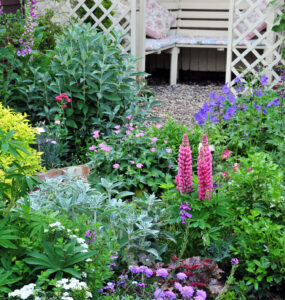
Ground Beetles: Gladiators of the Garden
by Rob Sproule
In old Hollywood movies you always knew who to root for. The good guys were handsome and the bad guys were ugly. It’s a money making equation that nature just doesn’t follow; some of the ugliest, nastiest critters in the garden are also most useful. This article is about a hero that is more often squashed than admired: the ground beetle.
You’ve seen them. They’re the half inch long, jet black monsters that leap out from under rocks and sticks, jaws looking like they can puncture steel. You probably jumped up, dropped your trowel, and moved to a different part of the garden.
As scary as they look, ground beetles rarely bite. If they do bite, it will be in self-defence and is non-toxic (even though you may smell a foul odour in some species). They live under anything they can shelter under and have vertical ribs running down their metallic looking backs.
Also called Carabids (for being in the family Carabidae), they boast an astonishing 40,000 species worldwide. They can be predatory or herbaceous, and the former eat their own weight in hapless prey every day.
What do they do?
Ground beetles are ravenous predators. Nocturnal, they’re rarely seen unless disturbed. They prowl the night devouring any soft shelled critter, whether it’s caterpillars, slugs, snails, grasshoppers, or lawn grubs.
They’re big and mean enough to hunt the pests that few other predators can. With powerful jaws, the ability to climb trees as they hunt, and their love of chomping into soft, helpless slugs, I’m glad they’re on our side.
Opportunistic feeders, they scurry out at night and use their long legs to move swiftly searching for prey. Their flattened bodies allow them to squeeze into tight spots.
They’re an early season predator, which means they’re mobilized faster than ladybugs to control aphids, and can help get help populations have getting out of hand. Agriculturally, they’ve been found to reduce crop damage from an assortment of species by up to 40%.
Introduced from Europe, the common black ground beetle has become a dominant species across Canadian backyards. They can’t fly, and have longer life cycles than most creepy-crawlies, taking a year to mature and living up to 3 years as adults.
Getting more of them
I have an older, chemical free yard that’s overflowing with mature plants. Given the amount of tasty foliage and the fact that many areas of ground level are so sheltered that they simply never dry out, I should have slug armageddon. But while I see some slug activity, now and then, the population stays well under control.
One of the big reasons is that my yard is full of ground beetles. Every night my gladiator force puts on their armour, crawls out from under their rock and eats any soft shelled nasty it can find.
Even for all their uses in slug control, few people think about attracting them to their yards. Ground beetles need shelter from the hot sun, and flock to dark, damp and sheltered places.
Thick patches of perennials (especially grasses and ground covers) will give them the moist and shady pockets they need for daily slumbers. Small stashes of bark chips or large stones work well, too.
“Beetle banks” started appearing in England in the 1990s. A form of biological pest control, they’re rows of bunch grasses, perennials, sunflower, and native plants. Strategically placed in between crops, beetles, aphid eating birds, and pollinating insects all shelter there, reducing the need for harsh insecticides.















